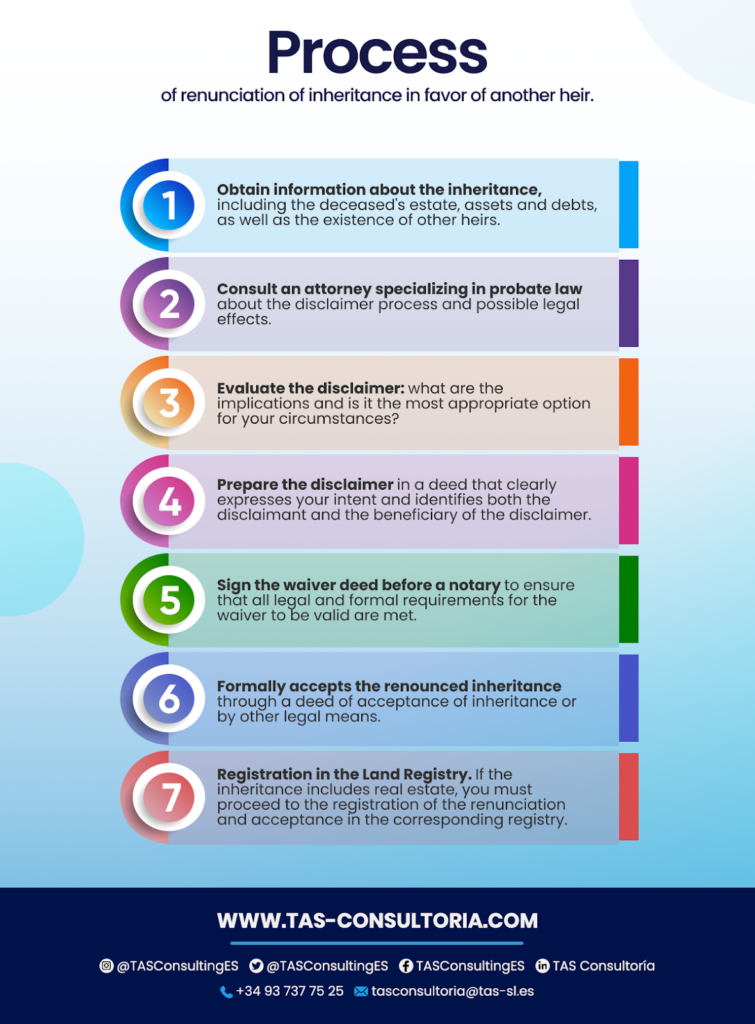
Below, we will answer the most frequently asked questions that arise when faced with an inheritance. That is, from the legal formalities to the tax implications. If you wish to clear your doubts and obtain valuable information on this subject, we invite you to continue reading. Find out how to effectively handle the inheritance and succession process in Spain.
How to find out the debts of a deceased person before deciding on the inheritance?
Discovering a decedent’s debts before making an inheritance decision can sometimes be complex. Knowing them can be a challenge. Unless the decedent left a detailed record of his or her debts in his or her personal documents at the time of death.
However, there are methods available that can provide clarity on this crucial aspect of inheritances.
Consultation with governmental and local entities
An important avenue is to request information from the Tax Agency or the Social Security Treasury. Also the municipalities where the deceased owned real estate. These institutions usually have relevant records that can help potential heirs to understand the financial situation of the deceased.
Review bank accounts and financial products
Another essential strategy involves consulting with the banks where the deceased held accounts and financial products. This would allow potential heirs to obtain information about financial positions in the entity, including assets and liabilities (debts).
This detailed evaluation is essential to have a clear idea before making a decision on one or more inheritances.
You may also be interested in: Reform of the Alien Law: new developments 2022
What is the right to deliberate and the deadlines for accepting or rejecting inheritances?
The right to deliberate gives the heir the opportunity to evaluate whether or not to accept the inheritance. By accepting the inheritance, he or she acquires both the assets and the debts of the deceased. For this reason, it is recommended to accept the inheritance “with benefit of inventory”.
This approach ensures that the heir does not have to assume them with his personal assets in case the debts exceed the inherited assets. The heir has 6 months to exercise this right as soon as the death of the deceased and his status as heir becomes known.
Once this period has elapsed, it is possible to accept the inheritance without this benefit. This means that, if there are more debts, the heir must settle them with the inherited assets and his own. This happens in many cases.
You may also be interested in: Substitute, complementary and corrective declarations.
What are the procedures for renouncing the inheritance in favor of another heir?
The renunciation of the inheritance in favor of another heir implies that an heir accepts the inheritance. This process generates the obligation to pay two taxes: inheritance tax for the inheritance and gift tax for the simultaneous donation. This implies a considerable tax burden in the field of inheritance.
In addition, it is possible to carry out a pure and simple renunciation, without specifying another heir. All if the will has provided for the vulgar substitution. In this case, if the initial heir does not accept and renounces, the inheritance is transferred in favor of the designated one. Thus avoiding additional taxes.
This analysis is essential to understand the tax and legal implications before deciding to accept or reject inheritances. Thus ensuring an informed and equitable decision-making in the field of inheritance. Know the steps to perform this procedure:

It is important to keep in mind that the inheritance waiver process may vary depending on the particular circumstances of each case. It also depends on the autonomic laws applicable in each community in Spain. Therefore, it is advisable to obtain specific legal advice for each situation.
What are the tax implications after renouncing inheritances?
By renouncing the inheritance, as described above, various legal and tax effects are triggered. It is crucial to understand which debts are inherited and which are not in this context.
Inherited debts and exceptions
In general terms, all debts that the deceased had during his lifetime will be inherited. Except for the penalties, since these are of a very personal nature and were only incumbent on the deceased. Upon death, these penalties cannot be enforced. For example, if the deceased had a tax debt and a related penalty, the heir will assume the debt, but not the penalty.
Waiver of inheritance and unknown debts
When accepting inheritances, it is not possible to renounce if unknown debts arise. This situation emphasizes the importance of performing a complete and thorough evaluation before making an inheritance decision.
Costs associated with inheritance by benefit of inventory
The option to accept the inheritance “with benefit of inventory” does not entail any cost. In terms of taxes or otherwise. This approach manifests itself at the moment of accepting the inheritance and it is highly recommended to opt for it.
Advantages of inheritance with benefit of inventory
The previously mentioned benefits of inheritances of this type are of great relevance. In particular, this approach ensures that the heir does not assume or pay debts that exceed the value of the assets inherited from the deceased.
This analysis provides a deeper understanding of the tax and legal implications after accepting or renouncing an inheritance. Thus enabling informed and equitable decision-making in this complex probate process.
You may also be interested in: How can you register for Social Security?
Do you want to face these processes efficiently and without legal or fiscal complications? We recommend you to count with the help of specialized professionals, you only need to contact us through tasconsultoria@tas-sl.es. A personalized agency can provide you with the necessary support to ensure that your inheritance issues are solved in an optimal way.
Do not hesitate to ask for the assistance of our experts to manage your inheritance and legal or tax formalities properly. Request now your agency for inheritance and access to a smooth and safe process!




Your email address will not be published .
Required fields are marked with *